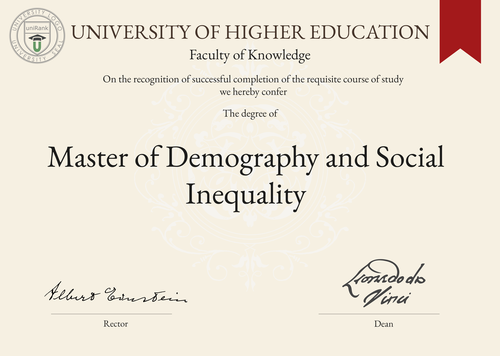
Master of Demography and Social Inequality (MDSI)
Guide to Master of Demography and Social Inequality Program/Course/Degree
Master of Demography and Social Inequality (MDSI)

Program Name:
Master of Demography and Social InequalityProgram or Degree abbreviation:
MDSIDuration range:
Varies by country and universityTuition range:
Varies by country and universityOverview:
The Master of Demography and Social Inequality program is designed to provide students with a comprehensive understanding of the relationship between demography and social inequality. This program explores the various factors that contribute to social inequality, such as age, gender, race and socioeconomic status. Students will gain knowledge and skills in demographic analysis, statistical methods and social research.Curriculum Overview by year:
The curriculum for the Master of Demography and Social Inequality program typically includes courses in demographic methods, social inequality theories, research design, statistical analysis and specialized electives. Students may also have the opportunity to engage in research projects or internships to apply their knowledge in real-world settings.Key Components:
- Demographic analysis - Social inequality theories - Research design - Statistical analysis - Specialized electivesCareer Prospects:
Graduates of the Master of Demography and Social Inequality program can pursue various career paths. They may find employment in government agencies, research institutions, non-profit organizations, or international organizations. Potential job roles include demographer, social researcher, policy analyst, data analyst, or consultant.Salary Expectations:
Salary expectations for graduates of the Master of Demography and Social Inequality program can vary depending on factors such as location, industry and years of experience. Generally, professionals in this field can earn competitive salaries, with the potential for growth as they gain more experience and expertise. For a more accurate understanding of salary expectations, you can utilize the Job Sites Search Engine, from our sister site jobRank, which searches over 4,600 job sites worldwide. Make sure to specify not only the job title but also the country you are interested in.Conclusions:
It is important to note that the duration, tuition fees, curriculum, key components, career prospects and salary expectations of the Master of Demography and Social Inequality program can vary depending on the chosen country or location of study, as well as the chosen university. Prospective students are advised to research and compare different programs and institutions to find the best fit for their academic and career goals. Visitors interested in pursuing the Master of Demography and Social Inequality degree can use the uniRank World Universities Search Engine to explore universities offering this program worldwide. This search engine provides a comprehensive database of universities, allowing individuals to find the right institution that meets their specific requirements.World Universities Search Engine
search for Master of Demography and Social Inequality (MDSI) and add the Location (country, state etc.) or specific University you are interested in studying at.
Query examples:
- Master of Demography and Social Inequality (MDSI) United States
- Master of Demography and Social Inequality (MDSI) United Kingdom online
- Master of Demography and Social Inequality (MDSI) Australia international students
- Master of Demography and Social Inequality (MDSI) University of California
- Master of Demography and Social Inequality (MDSI) University of London tuition fees
- Master of Demography and Social Inequality (MDSI) University of Sydney scholarships
Share Program/Course
Interesting? Share this program/course/degree info with your friends now.